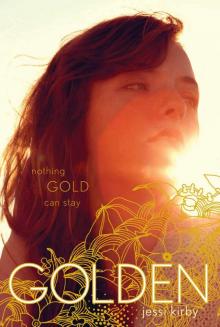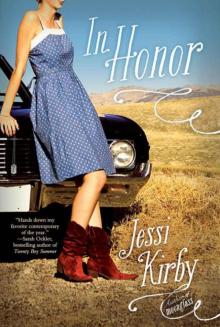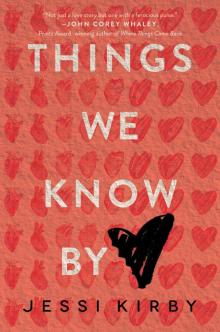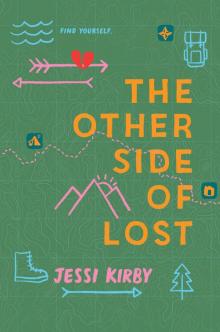- Home
- Jessi Kirby
The Other Side of Lost Page 7
The Other Side of Lost Read online
Page 7
I stand again and take my phone out of my pocket, then place my feet on either side of the medallion, and take a picture, marking that we made it here. I wish I had something better, or more meaningful to do, but this is the best I’ve got. I look around at the surreal landscape. What do people do at the top of a mountain like this? Celebrate? Meditate? Go back down? That seems so anticlimactic.
And then I remember something. At the end of every adventure we took, Bri had a tradition. We each had to find something tiny—a pebble, or a leaf, or maybe a mini pinecone, to bring back with us so we’d remember the day. Usually tired, and wanting to go home, I always made my choice quickly and based on proximity. I’d grab whatever small thing was nearby then shove it in my pocket, only to be forgotten and lost in the laundry later. Bri took her time choosing, though, and she cherished each little bit of nature she brought home with her. Her windowsills and shelves were always lined with these objects, and she could tell you the story of each one—what the day was like, where she found it, why she chose it.
I look down at the ground for something she might choose. There are no plants up here on this ridge, and the gravel all around is really just little pieces of granite, chipped off the gray rock where I stand. This seems fitting. To take a piece of Clouds Rest. I crouch to choose one, and when the sun glints off a piece with a shiny fleck of something metallic, I decide it’s the one and put it in my pocket to carry with me.
I’m so stiff and sore that it takes me a moment to stand back up, and when I do, I try to soak in the view, and to feel some shift in perspective or enlightening moment, but it feels forced. So I do what I normally would do. I lift my phone and take a panoramic picture of the sky and the mountains, careful to get the iconic silhouette of Half Dome as a point of reference in case I ever do post the picture anywhere. And then I flip the lens and take a shot of myself standing at the top of this mountain because that’s what you do when you go somewhere. You take a selfie and then you post it for everyone to see and comment on, and that’s how you know that what you did matters. I laugh. Out here that world feels far away, like a made-up story, but I try to imagine what I would say anyway, if I were to post a picture from today. Nothing comes, though. I’m too tired for even that.
The sun hangs low in the sky, and I know from Bri’s journal that she’d planned to watch the sunset from this point right here, but I can feel the air growing colder, chilling my damp clothes as it does. Every muscle in me is sapped, and I ache all the way down in my bones, so I give the view one last look, then turn and work my way back down to where I left Bri’s pack.
I’m confused at first when I see some of its contents strewn around on the rocks. What kind of person would go through another hiker’s pack like that? But as I get closer, I realize it wasn’t a person. It was a cat-sized, furry animal whose name I don’t know, and who happens to be still here, happily munching on one of the protein bars from the top pocket.
“Hey!” I lunge toward it, and it startles and runs—carrying the plundered bar with it.
For all I know, that bar was supposed to count for a whole meal, but I’m too tired to care. I pick up the empty baggie and the water bottle that now has teeth marks on it, then set to work finding a spot to pitch my tent, which I don’t know how to do. The sun hasn’t even touched the tops of the mountains yet, but I don’t know how long it’s going to take me to figure out the whole tent thing, and I definitely don’t want to be without one when it gets dark.
After a few attempts, I surprise myself and I figure it out, and soon I am the proud occupant of a tiny, orange, nylon cave. I lay out the bedroll and drag the pack inside, where it takes up most of the space, then I sit there in the fading light, unsure of what comes next. I’m too tired to eat, but I know I should, so I finish off a protein bar, stow the wrapper in the bear canister, then double-check that all food and anything that could possibly have a scent is inside of it. I swallow some Advil, take a few more sips of water. Sit in the quiet of my home for the night.
I’m tempted to just crawl into the sleeping bag as I am, but I can tell I need to deal with my feet first. I take a deep breath and ease them slowly out of Bri’s boots, one at a time, wincing at the pain of what lies beneath my socks. I’m afraid to peel them away and see the damage that I can feel, but if I want to make it back tomorrow, I don’t have a choice. Off come the socks too.
I’ve had plenty of blisters before, but nothing prepares me for the sight of my feet after the day’s hike. The skin of both Achilles looks like it’s been dragged across a cheese grater, and now I realize that’s what it feels like too. I reach for the tube of antibiotic ointment and dab it gingerly over the angry, red skin, then cover each heel with a bandage, because that’s all I have the energy to do. And then I lie back on the sleeping bag to catch my breath.
Above me, I can see the sky through the thin mesh that I didn’t bother to put the cover over because it felt too claustrophobic. I look up at my little patch of twilight sky, and try to think about the day, and what it means that I made it this far. It makes me wonder about tomorrow, and what Bri was going to do on Day 2.
I sit up and dig her journal out of the pack and flip to the page to find out. At first it doesn’t make sense, and I’m sure I’m reading things wrong. Misunderstanding something. I grab the guidebook and check and recheck it against Bri’s next entry that begins with: rejoin the JMT. I puzzle over the map in the orangey light of the tent, tracing my finger along the red dotted line that is the John Muir Trail, reading the names of destinations as I go. It’s not until my eyes wander away from the line that I realize a key point my cousin didn’t feel she needed to mention in her journal: the hike to Clouds Rest was a detour.
She was going to begin the journey of two hundred and eleven miles with a ten-mile detour.
I want to cry, but then I think about the post she wrote about hitchhiking to Canada, and her response to everyone who told her she was crazy: “You were right, but hey, I still made it.”
And I laugh instead. Then I take the pen from its leather loop and write at the bottom of Day 1.
I made it too.
I’ll Try
IT’S DARK WHEN the wind wakes me. It seems to come from all directions, blowing against the sides of my tent and lifting the flaps as it whips in through the vents beneath. Far above me, it rushes wildly through the trees. They creak and groan in a way that makes me wish I hadn’t pitched my tent beneath them. I sit up straight, heart pounding, and listen to the chaos outside, and it hits me how completely helpless I am in this moment.
There isn’t anyone I can ask for help. No one to tell me it’ll be okay. And I have no idea what to do. A sudden gust hits the tent with a force that sends my heart up into my throat, and I cover my mouth to keep from crying out. I grab the small flashlight and the pocketknife that I laid next to my head, and then I fumble around for my phone like somehow these things will keep me safe as I burrow down into the sleeping bag to wait it out.
All I can think is that I hope it’s almost morning, so I can get up and pack and get out of here and back to my room, with its bed surrounded by four solid walls, protected from all of the elements outside of them. Right now I don’t care what Bri wrote about not wanting to wake up in the same house every morning. I’d give anything to be there and never have to experience this again.
I try to stay calm, and I try not cry, but I fail at both when the next gust hits. There is nothing else to do. With the sleeping bag pulled tight around me, I curl into a ball beneath it and listen to the howl of the wind drown out the sound of my own tears.
I don’t know how much time goes by, but I drift in and out of sleep until eventually the wind settles, and darkness becomes softer around the edges. And then, out of nowhere and everywhere, complete silence descends. It’s a silence like none I’ve heard before, and it makes me sit up and take notice, because all of a sudden I realize something: I made it through the night.
I also realize how badly I have to pe
e after holding it through the night and the windstorm, so from where I sit, I fish out yesterday’s stiff socks from the boots where I tucked them. They scrape against my skin as I pull them over my feet, and I dig in the pack for a pair of sandals I’ve seen somewhere in the jumble. It’s not a look I would ever attempt in civilization, but I can’t think about forcing my sore feet into the hiking boots yet, and there’s no one around to see anyway. I unzip the little half-moon door and crawl out, a movement that immediately informs me that there is not a fiber of my being that doesn’t ache from yesterday’s hike. When I hobble away from the tent like an eighty-year-old and squat with shaking legs to do my business, it is a feat in itself.
Back at the tent, I rifle through the bear canister for something suitable for breakfast, though I’m not really hungry, and settle on a baggie of dried fruit. I don’t want to be in the tent another moment after last night, so I close everything back up tight in the canister and zip the door shut behind me, then take my breakfast for a walk up the ridge, hoping my muscles will loosen up as I go. The air is cool—cold even, and I shiver a little as I walk. It’s hard to believe it’s summer, and it makes me realize what a completely different world I’m in than I’m used to inhabiting.
At home, I’d still be sleeping, and by the time I woke up, the day would be well on its way to the typical August heat in Southern California. Here, the sun is just lighting the sky, and judging by what I read in the guidebook last night, there will still be snow on some of the high mountain passes that Bri was planning on crossing.
I shiver again, not wanting to think about what that would be like to hike through, and a second later, when I reach the outlook, I don’t think about it. Not at all. Because spread out in front of me is the brilliant sunrise sky, ignited by the sun that still hides behind the jagged peaks. I wish I could take a picture, because it’s even more breathtaking than the one I saw the morning I arrived—yesterday, I remind myself, though it seems so distant now too.
I breathe in deep and think about what the ranger said to me, how every day is a fresh start and a chance to be better than you were the day before. As I watch the morning light creep across the mountains, I believe it. Yesterday was brutal and last night was crazy, but I’m here today. And for the first time since I started, the landscape looks almost welcoming, like maybe I could be a part of it the same way Bri was. I have the thought then that maybe I’m not ready to go back just yet. And thanks to Bri and her detour, I have plenty of miles to hike back to the John Muir Trail before I have to make up my mind about that.
Back at my camp, which is really just my tent, I swallow a few more Advil and sit down with Bri’s journal to see what’s on her itinerary for today, just in case. On the Day 2 page I expect to see mileage and elevation and notes, like there was for Day 1, but that’s not what I find. Day 2 begins not with a destination, but a quote:
There is no mileage goal or place to camp listed. Just this. I read it over again.
Maybe it’s the exhaustion after yesterday, or the altitude that has me a little loopy, but the irony of both Bri’s and Muir’s words strikes me as funny. I definitely don’t feel fresh from the wind, and my cares have not so much dropped away as shifted to the most basic things, like making it down this mountain and finding water. Which doesn’t bode well for me if the challenges haven’t even begun. But then she’s not asking a lot for Day 2, and it makes me feel like I don’t want to let her down. I slip the pen from its loop and write my answer.
I’ll try.
It takes me close to an hour to get ready to go, because I’m determined to do a better job packing. I pull everything out of the pack, and try to remember how it had been arranged when it arrived. When that fails, I look at all of it and think about what would make sense if I were actually going to keep hiking. I start by putting the tent and bedroll down at the bottom of the pack, because I wouldn’t need those again until tonight. On top of that, I pack the extra clothes, and then I try to layer everything else in order of importance of accessibility on top of them. By the time I’m finished, the pack actually looks a little less unwieldy than it did yesterday. Which makes me feel a little more experienced than I was then. When I heave the pack onto my shoulders and click the straps around my waist and across my chest, I’m even a little proud.
And then there’s nothing left to do but step back onto the trail. I start down the mountain under the assumption that this part will be easier than yesterday, because it’s downhill. Very quickly, I realize that I am mistaken. The first thing I notice is the pain and soreness—so much, everywhere, despite the Advil I took before I started. The second is that it feels like I have to push back against gravity and the weight of the pack so that they don’t combine forces and send me tumbling down the trail. My toes dig into the fronts of Bri’s boots, and I imagine new blisters already beginning to form. My knees take the rest of the burden, and I have to concentrate on keeping them stable as I make my way down the thousands of vertical feet I climbed yesterday.
Down I go, and on the easier parts, I try to look around and notice the scenery, and let my mind wander somewhere else that is pain-free, but the majority of the time, the terrain and the challenge of moving through it demand my full attention. I hike with my eyes down, focused only on the narrow trail in front of me. I don’t know how long it takes me because time somehow seems irrelevant here, but by the time the sun is high in the sky, and I finally step foot back onto the John Muir Trail, the feeling is damn near euphoric.
Just off the trail, I spot a perfect rock to rest on. I take off my pack and nearly collapse onto the sun-warmed granite, looking up at the sky. Not one cloud interrupts the clear blue stretched out in every direction above me. I close my eyes and shield my face with my arm, then let the sunlight sink into my skin, and try to picture it like the Muir quote said—like nature’s peace flowing in. It almost feels like that. Or maybe it’s just exhaustion. Either way, I could drift off to sleep right here on this rock, right now, if I let myself. But I have a decision to make. It’s a simple one, really: keep going or turn back. I lie there with my eyes still closed, bouncing back and forth between the two choices.
Keep going or turn back? Keep going or turn back? Keep—
“Bri?” a female voice says out of nowhere. “Is that you?”
Her name is a shot of adrenaline. Immediately, I am on my feet, facing a hiker girl who looks about my age.
“Oh,” she says, looking a little startled. “I’m sorry, I thought you were someone I knew.” She makes a move to continue on wherever she was heading, but I reach out my hand in front of her.
“You called me Bri,” I say.
She nods. “Yeah, I know a girl by that name who has a pack that looks almost exactly like that—all those patches and pins,” she says, eyeing Bri’s pack resting next to the rock. She pauses, looking down at my hand, which still hovers in the air in front of her.
“How do you know her?” I ask.
“Um . . .” She gives me a wary look. “Do I . . . know you somehow?”
“No,” I say. “I’m her cousin.”
The girl breaks into a smile. “Ohhhh . . . okay! How IS she?” She looks around. “Where is she? She’s thru-hiking the trail this summer, right?”
My throat goes dry, and all of a sudden my chest feels tight. “Um.” Tears spring to my eyes, and the girl reaches out and grabs my hand now.
“What? What is it?” Worry creases her brow. “Is everything okay?”
I shake my head, and tears spill down my cheeks, and now she takes me by my shoulders, her voice more urgent.
“Did something happen? Is Bri okay?”
I shake my head again, force myself to say the words to this stranger who knew her, but doesn’t know about what happened. “No,” I say. “She . . . there was an accident, and . . .”
Her face goes pale. “What do you mean? What are you saying?”
“She’s gone,” I whisper, barely able to get the words out. “She died.”
<
br /> The girl falls to her knees in front of me and crumples forward into the dirt. I don’t know what else to do so I drop to my own knees beside her, and put a hand on her backpack. And there, in the middle of the trail, I join a stranger whose name I don’t know as she cries for my cousin beneath the cloudless blue sky.
Hike Your Own Hike
EVENING. We sit on opposite sides of the campfire Corrie built, and she listens intently as I tell the story of how I ended up here, wearing Bri’s backpack and boots, attempting to do at least part of her hike. Or rather, I tell her most of the story. I leave out the part about my social media life because out here, in its absence, I’m even more ashamed of it than I was at home.
But I do tell her that Bri and I had grown apart, and that it was my fault. It feels good to be honest about this, at least, and maybe it’s because she doesn’t know me, or because she did know Bri, but somehow I trust her with this admission. When I get to the part about our shared birthday, and the package arriving, and my crazy decision to drive all the way up here to hike Clouds Rest, she interrupts.
“Wow,” she says, hugging her arms like she’s trying to stay warm. “That is just . . . look.” She holds one arm out into the light of the fire, and I can see it’s covered in goose bumps.
“I know. It’s crazy, and I don’t actually think I could do the whole hike, but I thought—”
“I think you can do it,” Corrie says firmly. “And not only that, I think you need to do it.”
“Really?”
“Really. Things like this don’t happen without a reason, I truly believe that. And I also think that everyone who comes into our lives leaves us with a gift. I only knew Bri very briefly, but that was definitely the case with her.” She smiles. “I think getting you out here to do this was somehow her gift to you. Maybe even a chance for you two to find your way back to each other.”

 The Secret History of Us
The Secret History of Us Moonglass
Moonglass Golden
Golden In Honor
In Honor Things We Know by Heart
Things We Know by Heart The Other Side of Lost
The Other Side of Lost